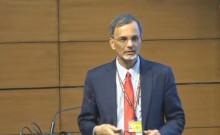
The International Monetary Fund (IMF) on Tuesday advised Gulf countries to speed up their switch to other energy resources from their current only-oil-based energy resource.
Oil-depending economies, especially those in the Gulf Cooperation Council (GCC), have been hit badly after the collapse in crude prices. These are countries whose economies are heavily dependent on revenues from oil, reported Agency France Press.
After the slump, GCC countries like Bahrain, Kuwait, Oman, Qatar, Saudi Arabia and United Arab Emirates cut public spending to maintain fiscal discipline. This has slowed economic growth considerably in these GCC member states.
In its Regional Economic Outlook, IMF projected GCC member's economic growth at just 0.5 percent this year, the worst since the global financial crisis of 2009.
"It is the right time for GCC economies to accelerate their diversification outside oil and to promote a greater role for the private sector to lead growth and create additional jobs. Preparing their economies for the post-oil era is something that is becoming a priority for authorities all over the GCC," Jihad Azour, director of the Middle East and Central Asia at IMF told AFP.
The IMF further projected that the economies of oil exporters in the Middle East and North Africa—including Iran, Iraq, Algeria, Libya and Yemen — would grow at 1.7 percent, campared to 5.6 percent last year.
"We are seeing governments developing diversification strategies and introducing a certain number of reforms to allow the economy to be prepared for the post-oil era. And those are important reforms," Azour said.
He further added that the GCC growth projections are mainly driven by the oil producers' deal to cut output to bolster low crude prices which meant GCC states pumped and exported less oil.
Introduction of the five percent value-added tax (VAT) was one of the reform measures that would allow the GCC countries to diversify their revenues away from oil, explained the IMF director.
"Its low rate will have a limited impact on price rise and inflation, VAT is estimated to generate between 1.5 and two percent of gross domestic product annually," Azour told AFP.






![Ultrahuman launches Ring PRO, free charging case with more than just power and Jade AI [details]](https://data1.ibtimes.co.in/en/full/829151/ultrahuman-launches-ring-pro-free-charging-case-more-just-power-jade-ai-details.png?w=220&h=138)










